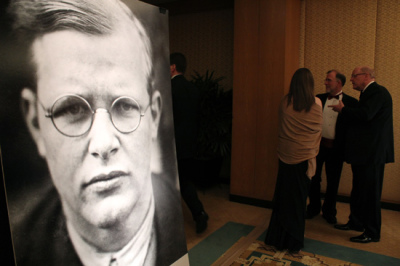We can learn from Bonhoeffer on abortion

On the first Monday of May, the ever-popular Met Gala was eclipsed by some of the most shocking and relevant news: the Supreme Court is in talks to overturn Roe v. Wade.
In the short time since then, pastors, doctors, politicians, activists, and practically everyone else has thrown their opinion on the matter into the whirlpool of chaos that is social media. If the nation has not been polarized enough, a monumental decision like overturning an almost 50-year-old decision legalizing abortion will cause more strain. Amidst the drama and information, the words of past generations prove helpful and sobering, a present help in remembering the foundations of the pro-life movement.
One of the most confounding theologians of recent history is the German pastor-spy, Dietrich Bonhoeffer. His faith confronting the rise of Adolf Hitler is spectacular, especially given that he was previously a devout pacifist. In his short, 39 year life, he accomplished many admirable things for the Kingdom of God. He was the first person to give the rest of the world information on the eventual rise of Hitler in Germany, though for other political reasons, Winston Churchill and Franklin Roosevelt would not assist Germany against this power. In addition to these heroic deeds, he wrote many essays and two powerful theological books: The Cost of Discipleship (1937) and Life Together (1939). He also wrote Ethics, which would go unfinished due to his martyrdom but be edited and published later.
Amidst the overwhelming, overstimulating amount of debate, points, and counterpoints of the now-revived pro-life/pro-choice discussion, a simple truth from Bonhoeffer’s unfinished Ethics is vital to remember:
“Destruction of the embryo in the mother’s womb is a violation of the right to live which God has bestowed upon this nascent life. To raise the question whether we are here concerned already with a human being or not is merely to confuse the issue. The simple fact is that God certainly intended to create a human being and that this nascent human being has been deliberately deprived of his life. And this is nothing but murder.
A great many different motives may lead to an action of this kind; indeed in cases where it is an act of despair, performed in circumstances of extreme human or economic destitution and misery, the guilt may often lie rather with the community than with the individual. Precisely in this connection money may conceal many a wanton deed, while the poor man’s more reluctant lapse may far more easily be disclosed. All these considerations must no doubt have a quite decisive influence on our personal and pastoral attitude towards the person concerned, but they cannot in any way alter the fact of murder.”
Bonhoeffer’s words do not encompass the nuance of abortion, but his key points remain foundational and fundamental: the embryo is life inside the womb, and therefore abortion at early stages and thereafter is murder of human life.
Even highly respectable scientists and medical professionals agree that life begins at fertilization with the embryo’s conception. All of the sources listed in this reference list for Princeton were published after Roe v. Wade, and they resoundingly agree that what develops inside a mother’s womb is, undeniably, life.
Bonhoeffer wisely yet noncomprehensively addresses the ways in which Christians should stand against abortion. While “all these considerations must no doubt have a decisive influence on our personal and pastoral attitude towards the person concerned,” he does not explicitly mark how one should act.
Indeed, Roe’s hopeful overturn would be a colossal step in the right direction. Yet more considerations and actions must be taken by Christians. If we are to fight for the lives of millions inside the womb, we must be no more prepared to protect and nurture them outside the womb.
Warren writes that there are many pro-life organizations, churches, and individuals that care for life outside the womb and are thereby breaking down the claim of “pro-life hypocrisy.” And yet, there is always more that can be done to protect the rights of women, children, and the unborn.
With the future of Roe uncertain, Christians should rally together in prayer and hope that the 50-year-old ruling is overturned. We must not, however, wait for that moment to come. There is action to take now. Stand for the rights of the living unborn, yes, but make every effort to provide access to adoption, childcare, housing, funding, and other ways for mothers and their children to survive a most-difficult experience.
Do not get so lost in the overstimulating amount of opinions and information that you forget what (or better, who) is at stake in the abortion discussion. These actions are most fundamentally propelled by what Bonhoeffer, among others before and after him, understood. That the rights at stake for the unborn are distinct, living, human rights.
Justin Bower is a student at Liberty University pursuing a degree in American Sign Language Interpretation with a minor in Biblical Studies. When he's not writing op-ed articles for The Liberty Champion or other Christian news sources, he writes for his personal blog and record/produce a podcast called Beggar & Bread.



























